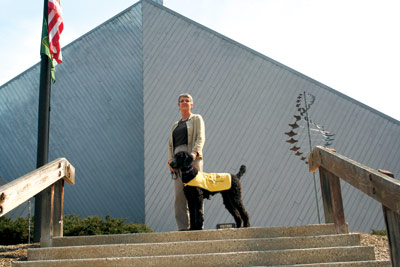I started work at the USDA Forest Service's Southern Research Station in Asheville last June. Soon after I arrived, I was intrigued to find one of my new co-workers, Libby Bagwell, bringing a dog to work. And the more I learned about how this dedicated woman is helping the visually impaired, the more curious I became.

Libby's been raising guide dogs for the blind for more than a decade. Since last July, she's been working with her 11th puppy — Mensa, a 10-month-old poodle.
"I began this incredible journey with my first dog in 1999, and each day I'm reminded of the privilege and responsibility I have in making a small contribution to fill a need in someone's life," explains Libby, who's a property-management specialist at the research station.
It begins when a puppy is about 7 weeks old. Guide dogs in training need to be repeatedly exposed to all possible situations, and the exposure must start as early as possible.
"Whenever I get a new pup, I realize anew what I've forgotten — that the dog really doesn't know anything," notes Libby. "I'm grateful to be able to take this undeveloped, fluffy bundle of love and help turn him or her into a life-changing companion for someone who's visually impaired. There's nothing more rewarding than watching a beautiful adult dog that you've trained guide a person down a sidewalk, around obstacles, through doors and to an empty chair with hardly a pause."
Puppy raisers take their charges with them everywhere they go — including the workplace — to help them learn impeccable manners, both at home and in public. "I am so thankful that my co-workers and the management at the Forest Service's Southern Research Station have been so supportive of this endeavor and welcome the pup into our office every day," Libby notes. "I consider it a welcome privilege to try to prepare a pup for every situation he might encounter in order to equip him for his future work as a guide."
After about 13 months, the dog is returned to the Guide Dog Foundation for the Blind for final training.
"I say I'm sending them off to college," Libby reveals. "I no longer cry when I hand the dog back to the trainer. Instead, I smile and say a prayer that this one, too, will become an inseparable companion to some deserving individual and enable them to achieve an even greater level of independence."
Even though I don't train dogs myself, I can't help but be impressed by the work Libby and other dedicated volunteers do. They must be prepared to adapt their lifestyle to the 24-hour care and training a puppy requires, but the rewards — and puppy kisses — make the sacrifices worthwhile. The Guide Dog Foundation invests more than $55,000 to breed, train and place each dog as part of a successful "team" with its owner (who also receives special training). People with disabilities pay nothing for the dogs or the training, and the nonprofit's funding comes solely from individual, group and corporate donations and foundation grants.
Libby says she finds comfort in knowing that "her" dogs are with wonderful, inspiring people who stay in touch with her. "None of the dogs that I have raised are in WNC; The closest one to me is in Warner Robins, Ga. I try to visit them once a year, but unfortunately finances didn't allow for that last year, and I really missed it! Thankfully, I have gotten to see all of them and have had several come back to visit me."
After nine months of observing Libby and Mensa together, I am continually amazed and am often reminded of how I interact with my children. Like a mother or father, puppy raisers try to prepare their "children" for the next stage in life and teach them right from wrong, hoping they'll go on to make a difference in somebody's life and make the world a better place.
To learn more about the Guide Dog Foundation or becoming a volunteer, visit guidedog.org.
[Fletcher resident Teresa Jackson is a public-affairs specialist at the Southern Research Station near the UNCA campus.]



Before you comment
The comments section is here to provide a platform for civil dialogue on the issues we face together as a local community. Xpress is committed to offering this platform for all voices, but when the tone of the discussion gets nasty or strays off topic, we believe many people choose not to participate. Xpress editors are determined to moderate comments to ensure a constructive interchange is maintained. All comments judged not to be in keeping with the spirit of civil discourse will be removed and repeat violators will be banned. See here for our terms of service. Thank you for being part of this effort to promote respectful discussion.